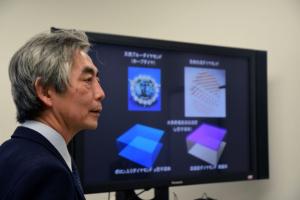Newly developed diamond transistor expected to reduce energy consumption in automobiles

Copyright : Waseda University
A research group led by Professor Hiroshi Kawarada (Faculty of Science and Engineering) has developed a highly efficient transistor used to reduce energy consumption in electric automobiles and trains.
The transistor is activated through regulation of electron holes on the surface of diamonds, can sustain 1600 volts per micrometer, and is resistant to temperatures of up to 400℃.
This diamond transistor considerably out performs standard silicon transistors and can compete with silicon carbide and gallium nitride power semiconductors which have received significant attention in recent years.
The transistor is expected to reduce power consumption for engines in automobiles, trains, and robots.
Research results were presented at the IEEE International Electron Device Meeting (IEDM) held in San Francisco from December 15th to 17th.
Associated links
Waseda University article
Media Contact
More Information:
http://www.researchsea.comAll latest news from the category: Automotive Engineering
Automotive Engineering highlights issues related to automobile manufacturing – including vehicle parts and accessories – and the environmental impact and safety of automotive products, production facilities and manufacturing processes.
innovations-report offers stimulating reports and articles on a variety of topics ranging from automobile fuel cells, hybrid technologies, energy saving vehicles and carbon particle filters to engine and brake technologies, driving safety and assistance systems.
Newest articles

You are What You Eat—Stanford Study Links Fiber to Anti-Cancer Gene Modulation
The Fiber Gap: A Growing Concern in American Diets Fiber is well known to be an important part of a healthy diet, yet less than 10% of Americans eat the minimum recommended…

Trust Your Gut—RNA-Protein Discovery for Better Immunity
HIRI researchers uncover control mechanisms of polysaccharide utilization in Bacteroides thetaiotaomicron. Researchers at the Helmholtz Institute for RNA-based Infection Research (HIRI) and the Julius-Maximilians-Universität (JMU) in Würzburg have identified a…

ASXL1 Mutation: The Hidden Trigger Behind Blood Cancers and Inflammation
Scientists show how a mutated gene harms red and white blood cells. LA JOLLA, CA—Scientists at La Jolla Institute for Immunology (LJI) have discovered how a mutated gene kicks off…



